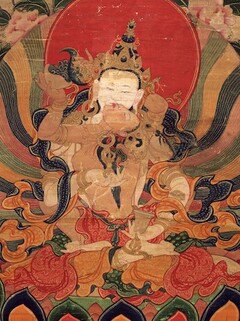Brief Confession Practice
༄༅། །ཉེས་བཤགས་མདོར་བསྡུས་དག་བྱེད་བདུད་རྩིའི་ཟེགས་མ་བཞུགས་སོ། །
A Drop of Purifying Nectar
A Brief Confession of Faults
by Jamgön Kongtrul Lodrö Thayé
རིགས་ཀུན་ཁྱབ་བདག་བླ་མ་རྡོ་རྗེ་སེམས། །
rik kün khyab dak lama dorjé sem
Guru Vajrasattva, pervasive lord of all buddha families,
རྩ་གསུམ་རྒྱལ་བ་རྒྱ་མཚོ་སྲས་དང་བཅས། །
tsa sum gyalwa gyatso sé dangché
Oceanic hosts of victorious deities of the Three Roots, together with your heirs,
མཁའ་ཁྱབ་ཡེ་ཤེས་རོལ་པས་རྟག་བཞུགས་ཤིང་། །
khakhyab yeshe rolpé tak zhuk shing
Displays of primordial wisdom, pervading all of space and remaining forever,
ཉིན་མཚན་དུས་དྲུག་གདུལ་བྱར་གཟིགས་པ་རྣམས། །
nyintsen dü druk duljar zikpa nam
You who look upon beings to be tamed throughout the six times, day and night,
ཐུགས་རྗེ་བརྩེ་བ་ཆེན་པོས་དགོངས་སུ་གསོལ། །
tukjé tsewa chenpö gong su sol
Consider us with your great compassion and love, we pray.
ཉམས་ཆགས་སྡིག་སྒྲིབ་འབྱོང་བར་བྱིན་གྱིས་རློབས། །
nyamchak dikdrib jongwar jingyi lob
Grant your blessings so that we may purify our impairments and breakages, misdeeds and obscurations.
བདག་ཅག་ཐོག་མེད་དུས་ནས་ད་ལྟའི་བར། །
dakchak tokmé dü né danté bar
Throughout beginningless time until now,
མ་ཤེས་མ་གུས་བག་མེད་ཉོན་མོངས་པས། །
mashé magü bakmé nyönmongpé
Through ignorance, disrespect, and carelessness, and through the afflictions,
མི་དགེ་བཅུ་དང་ལྕི་བཞི་ལོག་པ་བརྒྱད། །
mi gé chu dang chi zhi lokpa gyé
We have accumulated the ten non-virtuous actions, the four grave misdeeds,1 the eight perverse actions,2
མཚམས་མེད་ལྔ་དང་དཀོན་མཆོག་དཀོར་སྤྱད་སོགས། །
tsammé nga dang könchok kor ché sok
The five acts of immediate retribution, misuse of the Three Jewels’ property and so on,
ལུས་ངག་ཡིད་ཀྱིས་སྡིག་སྒྲིབ་བསགས་པ་དང་། །
lü ngak yi kyi dikdrib sakpa dang
All the negative actions and obscurations of body, speech, and mind,
གཞན་ལ་བགྱིད་སྩལ་རྗེས་སུ་ཡི་རང་བས། །
zhen la gyi tsal jesu yirangwé
And we have encouraged others to do likewise and rejoiced in their deeds,
འཁོར་བ་ངན་སོང་རྒྱུ་རུ་གྱུར་པ་ཀུན། །
khorwa ngensong gyu ru gyurpa kün
All of which will become causes for saṃsāra’s lower realms.
རབ་ཏུ་གནོང་ཞིང་འགྱོད་པས་མཐོལ་ལོ་བཤགས། །
rabtu nong zhing gyöpé tol lo shak
All this we openly admit and confess with intense remorse and regret.
སོ་ཐར་བྱང་སེམས་བྱ་སྤྱོད་སྡོམ་པ་སྤྱི། །
sotar changsem jachö dompa chi
The general vows of personal liberation, bodhicitta, Kriyā and Caryā,
ཁྱད་པར་བླ་མེད་ནང་པའི་ཐེག་པ་ཡི། །
khyepar lamé nangpé tekpa yi
And especially, the hundred thousand samayas related to the four empowerments
དབང་བཞིས་བསྡུས་པའི་ས་མ་ཡ་འབུམ་སྡེ། །
wang zhi düpé samaya bum dé
In the unsurpassable vehicles of the inner tantras,
སྐུ་གསུང་ཐུགས་དང་ཡན་ལག་ཉི་ཤུ་ལྔ། །
ku sung tuk dang yenlak nyishu nga
Samayas of enlightened body, speech, and mind, the twenty-five branch samayas,
སྒྲུབ་པ་ལྷག་པའི་དམ་ཚིག་ལ་སོགས་པར། །
drubpa lhakpé damtsik la sok par
The special commitments of accomplishment, and so forth—
ཚོར་དང་མ་ཚོར་དངོས་དང་བརྒྱུད་པ་ནས། །
tsor dang ma tsor ngö dang gyüpa né
All transgressions, deteriorations, breaches, and violations,
འགལ་ཉམས་དམ་འདས་རལ་བར་གྱུར་པ་ཀུན། །
gal nyam dam dé ralwar gyurpa kün
Commited knowingly or unknowingly, directly or indirectly,
སྙིང་ནས་གནོང་འགྱོད་དྲག་པོས་རྒྱུད་གདུངས་ཤིང། །
nying né nonggyö drakpö gyü dung shing
We openly admit and lamentingly confess,
སྨྲེ་ངག་དང་བཅས་མཐོལ་ཞིང་བཤགས་ལགས་ན། །
mé ngak dangché tol zhing shak lak na
Tormented by intense, heartfelt remorse.
དམིགས་མེད་ཐུགས་རྗེའི་ཀློང་དུ་བཟོད་པར་བཞེས། །
mikmé tukjé long du zöpar zhé
In the expanse of non-referential compassion, pray, grant forgiveness!
འདི་ཕྱིར་སྒྲིབ་པའི་མུན་ཚོགས་སྐད་ཅིག་ལ། །
di chir dribpé mün tsok kechik la
Let the darkness that obscures this and future lives be banished in an instant,
བསལ་ནས་ཡེ་ཤེས་སྣང་བ་རྒྱས་མཛད་གསོལ། །
sal né yeshe nangwa gyé dzé sol
And cause the light of primordial wisdom to shine forth!
ཀྱེ་མ་མགོན་པོ་ཐུགས་རྗེའི་དབང་ཕྱུག་རྣམས། །
kyema gönpo tukjé wangchuk nam
Alas! Mighty protectors, lords of compassion,
དུས་ངན་མཐར་སྐྱེས་རྨུ་རྒོད་བདག་འདྲ་བ། །
dü ngen tar kyé mugö dak drawa
Look upon savages like us, born in this degenerate age,
ཆོས་སྒོར་ཞུགས་ཀྱང་ཆོས་མིན་ལམ་ངན་ཏུ། །
chögor zhuk kyang chö min lam ngen tu
Who enter the door of Dharma but then, overwhelmed by karma and afflictions,
ལས་ཉོན་ཤུགས་ཀྱིས་དབང་མེད་འཇུག་རྣམས་ལ། །
lé nyön shuk kyi wangmé juk nam la
Set out upon evil, non-dharmic paths,
ལྷག་པར་ཐུགས་བསྐྱེད་དམ་བཅའི་རྩལ་སྤྲུགས་ཏེ། །
lhakpar tukkyé damché tsal truk té
With special resolve and intensify the power of commitment.
ངན་འགྲོའི་གཡང་ལས་ཟློག་པར་མཛད་དུ་གསོལ། །
ngendrö yang lé dokpar dzé du sol
Lead us away from the abyss of the lower realms, we pray.
བློ་སྣ་ཆོས་སུ་འགྱུར་བར་མཛད་དུ་གསོལ། །
lona chö su gyurwar dzé du sol
Cause us to turn our minds toward the Dharma, we pray.
དམ་སྡོམ་རྣམ་པར་དག་པར་མཛད་དུ་གསོལ། །
dam dom nampar dakpar dzé du sol
Make our vows and commitments utterly pure, we pray.
ཚེ་དང་སྒྲུབ་པ་མཐར་ཕྱིན་མཛད་དུ་གསོལ། །
tsé dang drubpa tarchin dzé du sol
Help us to reach the full measure of life and practice, we pray.
ཚེ་འདིར་སངས་རྒྱས་འགྲུབ་པར་མཛད་དུ་གསོལ། །
tsé dir sangye drubpar dzé du sol
Cause us to attain buddhahood in this very life, we pray.
ཐུགས་དམ་མ་གཡེལ་བླ་མ་སངས་རྒྱས་ཀྱེ། །
tukdam ma yel lama sangye kyé
Do not neglect your commitment, O guru! O Buddha!
ཐུགས་རྗེས་གཟིགས་ཤིག་དཀོན་མཆོག་རིན་པོ་ཆེ། །
tukjé zik shik könchok rinpoché
Look upon us with compassion, precious Three Jewels!
བྱིན་རླབས་མ་ཆུང་རྩ་གསུམ་ལྷ་ཡི་ཚོགས། །
jinlab ma chung tsa sum lha yi tsok
Let your blessings be not slight, deities of the Three Roots!
བསམ་དོན་ཆོས་བཞིན་འགྲུབ་པའི་བྱིན་བརླབས་སྩོལ། །
samdön chö zhin drubpé jinlab tsol
Bless us so that all our wishes that accord with the Dharma may be fulfilled!
ཉེས་བཤགས་མདོར་བསྡུས་འདི་བཞིན་དཔལ་ཁྱིམ་སྔགས་འཆང་ཀརྨས་བསྐུལ་ངོར་ཡོན་ཏན་རྒྱ་མཚོ་བློ་གྲོས་མཐའ་ཡས་པའི་སྡེས། ཙཱ་འདྲ་རིན་ཆེན་བྲག་གི་དབེན་གནས་སུ་བགྱིས་པ་དགེ་ལེགས་འཕེལ།། །།
This brief confession of faults was composed by Yönten Gyatso Lodrö Thayé at the request of the glorious householder and mantra adept Karma in the solitude of Tsadra Rinchen Drak. May virtue and excellence increase!
| Translated by Adam Pearcey, 2024.
Source: 'jam mgon kong sprul blo gros mtha' yas. "Nye bshags mdor bsdus dag byed bdud rtsi’i zegs ma." In rgya chen bka' mdzod/ (dpal spungs par ma 'brug spa gro’i bskyar par ma/). Paro: Ngodup, 1975–1976. Vol. 12: 369–370.
Version: 1.0-20240227
- ↑ lci ba bzhi. 1) Sitting at the head of a row of scholars, 2) appropriating a mantra practitioner's wealth, 3) accepting the prostrations of fully ordained monk, and 4) eating a practitioner's food.
- ↑ 1) to criticize good, 2) to praise evil, 3) to interrupt a virtuous person's accumulation of merit, 4) to disturb the minds of the devoted, 5) to renounce one's spiritual master, 6) to renounce one's chosen deity, 7) to renounce one's vajra siblings, and 8) to desecrate a maṇḍala.
